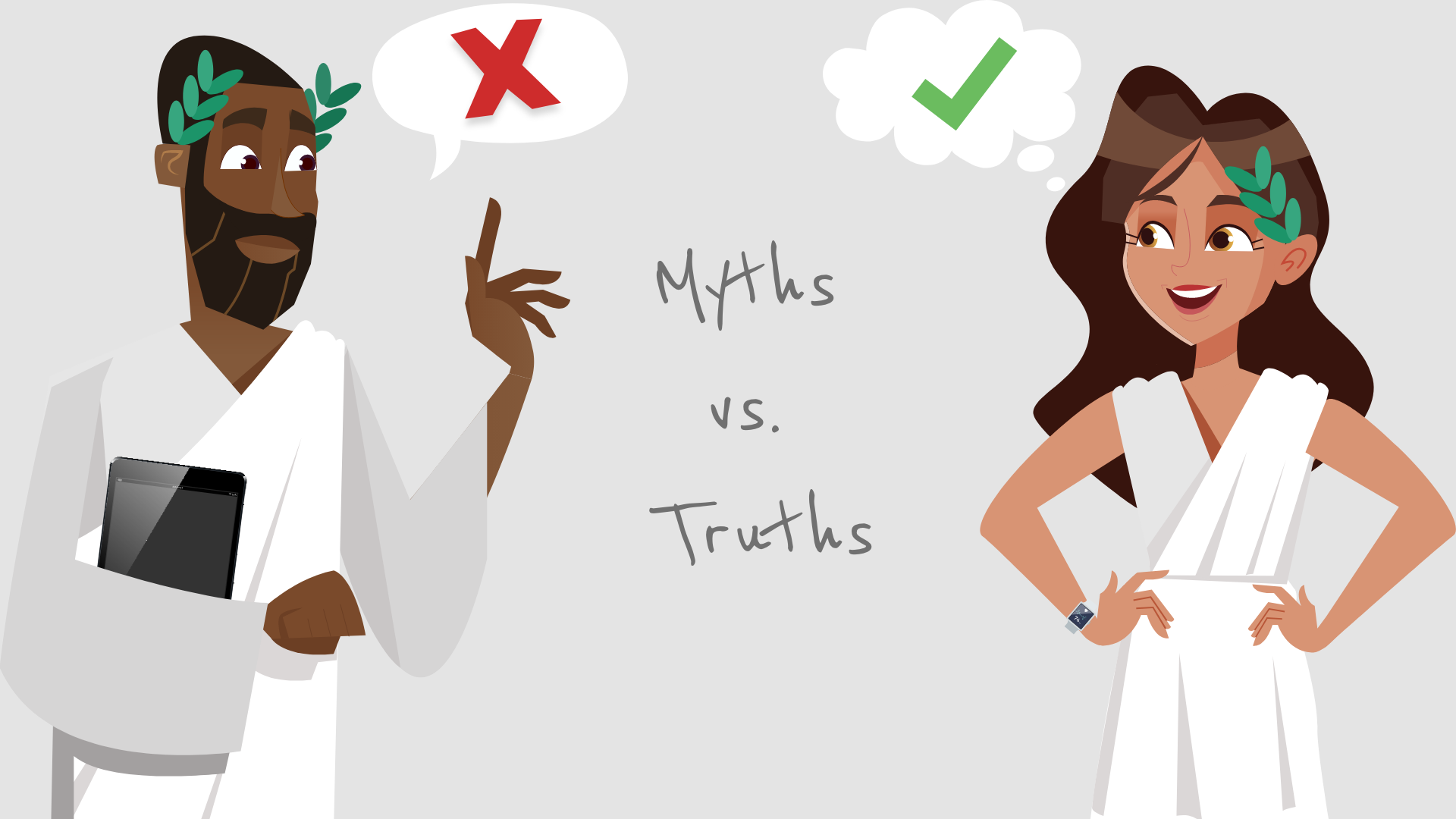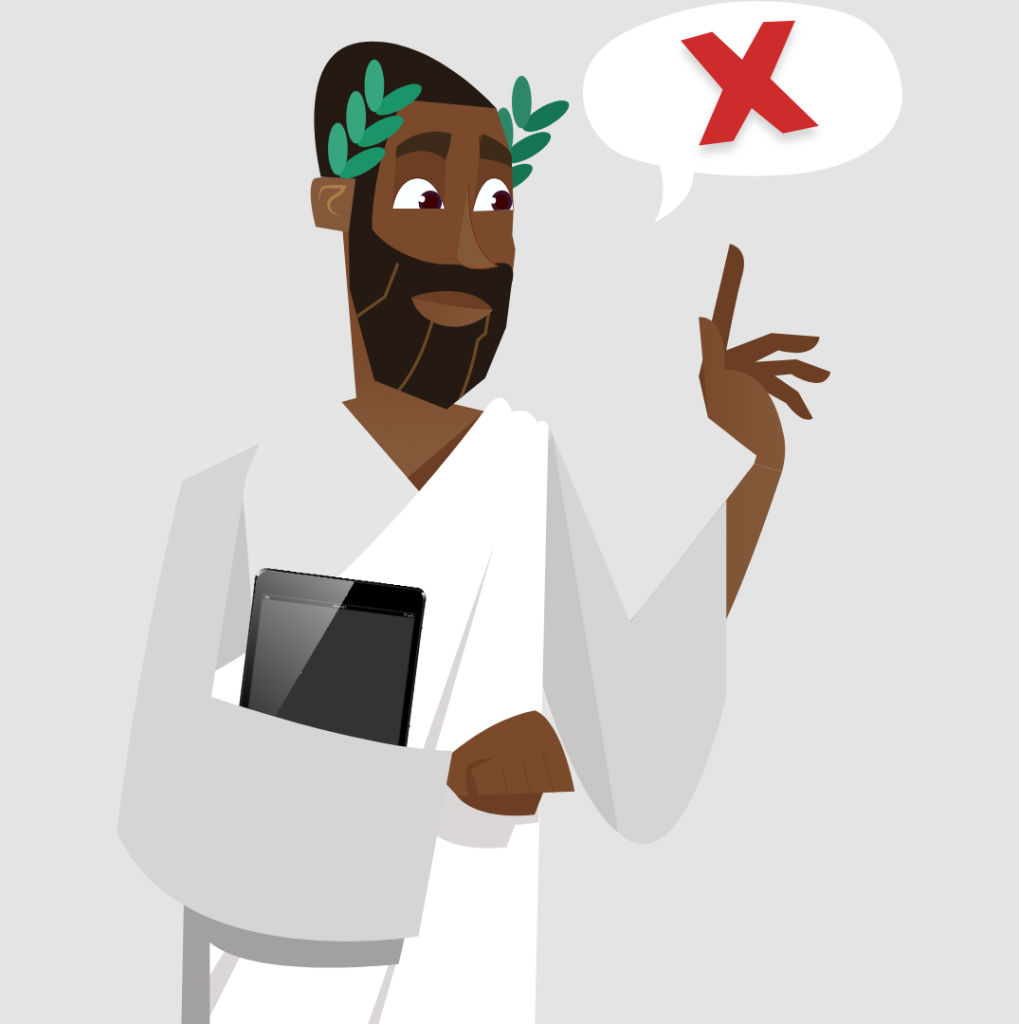
If you decide to ask around about marketing automation, it’s likely you’ll hear both good and bad things that can confuse you and give you the wrong impression.
That’s why we decided to set the record straight. Below you’ll find out the 16 marketing automation myths that need to be busted and 15 truths about how your business can benefit from it.
What Does Marketing Automation Do?
Businesses use marketing automation software to automate, streamline, and measure various marketing activities to increase efficiency and improve customer experience.
Marketing automation can include anything from email marketing, landing pages with forms, segmentation of audience and content, bulk SMS marketing, direct mail marketing, integration capabilities, analytics and tracking, social media posting, A/B testing, and more.
And when you use and implement marketing automation correctly, it can be an excellent investment producing results that pay off.
16 Marketing Automation Myths

You’ll occasionally come across statements that are not true and give the wrong impression about marketing automation.
Here are 16 common myths about marketing automation:
1. It’s impersonal and robotic
Technology and computers are perceived as something devoid of emotions and the spark that we as humans bring to the table.
The software helps you learn about your audience, distribute content, and get everything in front of the right audience at the right time. However, it’s people who add the human touch and create personal, relevant, and valuable content and decide who should receive it.
2. It’s too expensive
There are hundreds of marketing automation software companies, which means you can have your pick of the litter. True, some are on the higher price end, but many are affordable; you need to see which one fits your business needs.
Here’s where free trials, freemiums, demos come in handy. They let you test the solutions before you decide to buy. And when used right, the profits from using automation software outweigh its cost.
Businesses that use marketing automation for lead nurturing experience a 451% increase in qualified leads.
Business2Community
3. It’s only for enterprises and big teams
Many of the marketing automation providers specialize in small or mid-sized businesses and even solopreneurs. They have the tools that small businesses need to scale their business without feeling overwhelmed.
With a little bit of research and testing the free versions, you can easily find your match. A solopreneur, freelancer, small or large business, you can use the power of this software to your advantage.
4. It’s the same as email marketing
Some automation software platforms specialize only in email marketing. Still, others offer a range of other tools like landing page builders, bulk SMS marketing, direct mail marketing, pop-ups, customer journey builders, integrations, and much more.
There’s no need to use every tool in the box. If your business needs only email and landing pages, then go for software praised for these features. It’s okay if you don’t use direct mail as a channel, not everyone needs to use the full spectrum of opportunities of the marketing automation software.
5. It’s spamming people
You can spam your customers with or without automation software.
Those that use marketing software know that you set and schedule communication send-outs. Test and compare open and click rates at different times to find when is the best time to send. The sending frequency is also something you need to consider. Think of it this way; send when you have something valuable and relevant to say.
6. You can set it and forget it
This is a dangerous road to tread on. The software lets you set up and plan everything so that you are not overwhelmed.
But, you need to check in from time to time to see if everything works as it should, track the progress, see if any changes are required, basically stay on top of your campaigns and their results.
7. It only sends messages automatically
Yes, automation is used to schedule and send different types of communication automatically.
Its true potential lies in the opportunities it offers when it comes to efficiency, targeting the right audience, tracking, measuring, testing, and the chance for optimizing your campaigns. The data you get is essential for you to get to know your customers.
8. It’s too complicated to use
Today’s solutions strive for a user-friendly interface and tools that are simple enough to be used by even someone who has no experience in the world of marketing automation. Plus, MA solutions usually have some type of documentation, onboarding program, or training to help you learn how everything works. If you are a rookie, it’s also crucial that you start with the basics and then tackle more advanced tools.
9. It fixes all marketing problems
Marketing automation lets you get some burden off your shoulders, enables you to multitask, be time-efficient, and explore endless marketing opportunities.
However, you need to decide how automation fits into your strategy and how it will help you achieve your marketing and business goals.
It also helps you pinpoint problems and optimize where necessary, but if you use it with no plan or strategy whatsoever, it won’t do any good for your business. It certainly won’t solve any problems you have.
10. It’s only for the marketing team
On the contrary, the data the software provides you with can teach you about your customers, their behavior, where you need to focus, and what is worth investing in.
This means that marketing, sales, support, success teams can benefit from it. Especially when they all work together and exchange insights. By including different teams, you’ll be able to pinpoint gaps and opportunities and learn when other teams need to step in and take over.
11. It means you need less content
Here’s another misconception. You can recycle a piece of content and send or post it several times, but you need to bring fresh, valuable content to your customers regularly if you wish to keep them engaged.
The software helps you distribute content on different channels and on time, but that doesn’t mean you should stick with the same thing over and over again.
12. It’s lazy marketing
Many believe that marketing automation makes you a lazy marketer, you schedule emails and sit back and chill.
But automation requires planning and effort to implement entire campaigns that shouldn’t be left unmonitored or unchecked. Which means you are not lazy, you work more efficiently to keep your processes optimized and get the most of your marketing efforts.
13. It requires expert technical knowledge
If this were the case, only marketing automation experts would be able to use it, and you’ll need to hire one or fail miserably.
Luckuly, the range of users of marketing automation branches to every industry and profession. Not every solution out there is on the same difficulty level, and some will require you to get the hang of the terminology before you start using it.
The bright side is, the majority have a collection of help center articles, videos, a support team, training, and an onboarding program that will show you the best ways to use its solution.
14. It will replace marketers
There’s one thing that technology won’t ever replace – the human element.
Creativity, which is part of a marketers’ mindset, can’t be done by machines. No matter what becomes automated, there’ll always be a need for a marketer to guide the creative direction of a business.
Moreover, consumers love the human touch when communicating with brands; they want to know that there is a person on the other side. Ever wondered why brand personalities have human attributes like fun, friendly, compassionate? Because people like talking to people.
15. It gets you tons of leads with no effort
Sure it’s easier to get a lot of leads by automating your lead generation process. Will all of them be quality leads with the potential to convert if you don’t put any thought into the campaign?
Nope, and you’ve just wasted the time of the sales team as well. To get quality leads, you need to put in some thought and effort into your content and campaign creation and know what your potential customers want. This way, you know which leads should be pursued.
16. There’s no need for it once the lead converts
One of the main goals of marketers is to bring in more qualified leads that will become customers. Marketing automation shouldn’t stop with lead generation and conversion.
Once you get a customer, you can automate different processes like welcome and retention programs, and create opportunities for cross or upselling. These contribute to prolonging the customer life cycle and even can turn your loyal customers into brand promoters.
15 Marketing Automation Truths

Now that you know the myths that surround automation, let’s go over the facts. There are different ways in which businesses big and small can benefit from using a marketing automation solution.
Here are 15 reasons why marketing automation is a game-changer for your brand, business, and customers:
1. It brings different teams together
Marketing and sales can work together to get better leads and optimize the handover process.
Support teams can point out common problems that can become great content pieces and lead magnets. Success teams can contribute with insights about existing customers, which can improve targeting, buyer persona profiles, and customer retention. Neat, right?
2. It increases revenue & conversion rates
When you handle everything from one place, it’s easier to communicate, follow-up, and respond in a timely matter. This improves your customer experience and increases brand awareness, customer satisfaction, which in turn increases your ROI and conversion rates.
3. It gives you measurable data
Some of the best benefits of automation are tracking and analytics, which show you the campaign results. This data can include lots of things from demographics to campaign data like opens, clicks, visits, form submissions, and more. This way, you can make decisions backed by data.
4. It helps optimize your funnel
The data you get can show you any ups and downs, optimization and targeting potential, or any gaps where leads fall through. You’ll be able to see the bigger picture and improve where necessary to ensure that the journey from visitor to a brand promoter is flawless.
5. It helps optimize your budget spending
Once you see which channels and content types are the most attractive for your audience, you know where to focus your future efforts. Cutting costs for things that don’t work can save you money which you can invest in trying out new approaches and ideas.
6. It lets you focus on strategy
By automating processes, you’ll free time to focus on other tasks, like testing new ideas or improving your marketing strategy. You shift your focus on the results and what they tell you rather than on manual set-up processes.
7. It saves time & resources
One or several people can handle the workload by using automation. You’ll cut down on repetitive, manual, time-consuming tasks and do several things at once—no more switching between accounts, apps, services.
8. It helps scale your business
This is the sum of all the benefits of using marketing automation software. By delivering what you promise and improving customer experience, you’ll start building trust. Trustworthy businesses are the ones that grow.
9. It keeps customers engaged
There are infinite ways you can make sure your audience engages with you. With nurture, retention, and re-engagement campaigns, you’ll keep up with your customers every step of the way. And you reduce the chances of leads or customers slipping through your fingers.
10. It helps you build relationships with people
Use the perks of automation to tailor the experience and make it unique. People love brands that care, listen, and communicate in a personal way. Brands that build strong relationships with customers survive and thrive as opposed to those focused only on sales.
11. It helps you increase the customer lifetime value
If you provide your customers with exceptional experiences, they’ll come back and stay with you for a longer time. So focus on seamless communication and value to make people come back. Special offers for your returning customers can do wonders when it comes to brand loyalty.
12. It lets you stay consistent
There’s no need to switch between a million tabs and go to different apps when you handle everything from one place. You’ll have a better overview of the message you send and when to send it. Plus, if you and your retailers work together, everyone can rest assured that the brand is represented correctly everywhere.
13. It lets you monitor all communication channels
Since functional marketing automation is about cross-channel or omnichannel presence, you have the advantage of handling everything from one place from email and SMS to social media.
You’ll see which communication channels are the most effective for your business, where you need to focus your efforts, and maybe which one you should get rid of. It also enables you to create smooth experiences for your audience no matter where they encounter you.
14. It integrates with apps, services, & CRM systems
One significant advantage of MA software is that it lets you integrate with CRM systems, apps, and services that you already use. The integration lets different apps ‘communicate’ with each other and share data so that you don’t have to manually do it. Some marketing automation solutions offer more integration opportunities than others; you need to see if the solution you want has those you need or ask whether they’ll be added in the near future.
15. It can trigger different responses
This means that you send different messages, notifications, or take specific actions based on your customers’ activity or behavior. Send reminder emails for abandoned carts, re-engagement content for customers idle for X amount of days, discount coupons as a response to a one-word SMS, and much more.
In the end, marketing automation can be an excellent investment for any business when used the right way. Whether a rookie or an expert, solo business owner, or an enterprise, there is a solution for all – it all comes down to knowing what your business needs.
